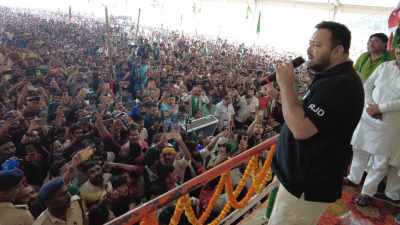Year after scandal, Andhra villagers begin selling children again
DEVARAKONDA (NALGONDA), APRIL 30: Life never changes in the Lambada hamlets of Andhra Pradesh. Last year, they hit national headlines for ...

DEVARAKONDA (NALGONDA), APRIL 30: Life never changes in the Lambada hamlets of Andhra Pradesh. Last year, they hit national headlines for sale of infants to adoption centres in Hyderabad. Hardly a year later, just as the scandal recedes from public memory, the business is back. Their children are up for sale again.
Caught in a vicious cycle of poverty and hunger, the Lambada tribals are again selling off their girls. Reliable sources say that such incidents are in fact on the rise.
Nearly 200 girls were rescued by the police from various adoption centres in Hyderabad last year. Some of them were lodged at the Sisuvihar and others handed over to the voluntary organisation, SOS.
After keeping a low profile for nearly 10 months, the agents of child traffickers have appeared in some of the hamlets. They started coming in from February.
According to locals, at least 10 infants were sold in Nakkalagandi, Bapangodu, Telidevarapalli, Osmankunta and Venkatigani in the past two months.
The latest sale was reported from Nakkalagandi tanda. The parents who sold their one-week-old girl child were identified as Hemli and Ramulu. Incidentally, it was the sale of a girl child from this hamlet that led to the discovery of the scandal last year.
When asked, Hemli initially told The Indian Express that she did not give birth to any girl child since last year. After repeated questions, she admitted that she had indeed delivered a girl three weeks ago. “She died of a mysterious disease at a hospital in Devarakonda,” Hemli said while her husband gave the name of another hospital. Subsequently, both claimed that the girl died in Hyderabad and they cremated the child in the city itself.
But the villagers tell the true story. Hemli’s brother Zemra, a rickshaw-puller visited the hamlet a fortnight ago along with a woman and another man in a car. The parents and the three left the tanda (village) in the car after a deal was struck for Rs 10,000. A few days later, the parents returned — without the baby.
Another incident occurred in the neighbouring Bapangodu in February. The parents were Diwli and Sakria. Locals said that they had left the hamlet after selling their infant and are expected to return after the onset of monsoon. This correspondent was told of similar incidents in Osmankunta, Telidevarapalli and Venkatigani.
In fact, at Bapangodu, a seven-month pregnant woman, Tirupatamma, asked this correspondent as soon as the car came to a halt: “Will you buy children? How much will you give me?” Asked whether anyone approached her recently, she said: “Strangers are coming in cars and making inquiries about pregnant woman and infant girls.”
With last year’s experience, the agents appeared to have changed their strategy. Unlike in the past, they are going about the business discreetly. The main agents remain behind the scene and with the help of educated tribal youth, they make inquiries about pregnant women and the likely date of delivery.
“They are the same people who purchased children last year. However, this time, they are moving discreetly and luring the educated Lambada youth with hefty sums,” Ravi Naik, a local youth, told this newspaper.
They also hiked the “tariff” from Rs 2,000 last year to Rs 10,000 per child this year. Half of the money would go to a sub-agent and the rest would be paid to the parents.
When the racket came to light last year, the district administration hadpromised to develop the affected areas and improve the standard of living so that parents would not be forced to sell their girl child. “But it remained just a promise. The people here continue to live in abject poverty and ignorance,” said Somanna, an advocate.
For instance, Wali of Nakkalagandi tanda, who sold her daughter last year, was promised a five-acre plot by the district administration. “I am yet to receive help from the government. No official has visited the hamlet,” Wali said.





- 01
- 02
- 03
- 04
- 05


























